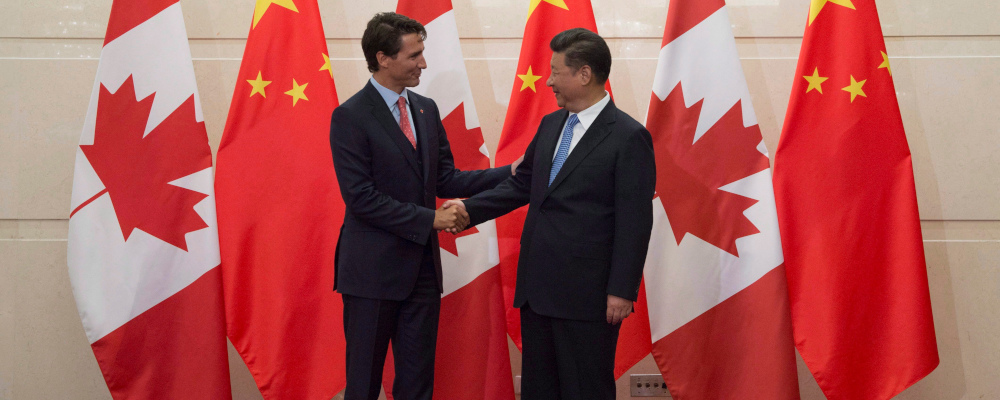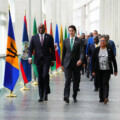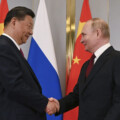This month marks an important milestone in the modern history of Canadian policy and politics. Forty years ago, on November 5, 1982, the Royal Commission on the Economic Union and Development Prospects for Canada was established. Readers may be more familiar with its colloquial name, the Macdonald Commission, for its chair, former Liberal Cabinet minister Donald S. Macdonald. The commission was set up by Prime Minister Pierre Trudeau in a context of significant economic, geopolitical, and intellectual flux and went on to have major long-term consequences for the Canadian political economy.
As we find ourselves in a new era of economic, geopolitical, and intellectual disruption, the exercise of ideational renewal reflected in the Macdonald Commission has tremendous relevance for our current moment. It presents a necessary path forward for a new policymaking narrative that’s responsive to today’s changed circumstances and capable of securing broad-based support across the political spectrum.
Forgive us a brief recap of the Macdonald Commission and its own economic and geopolitical context. It was launched in the face of a protracted economic recession, a prime interest rate of 12 percent, the impending death of Soviet leader Leonid Brezhnev, and the early stirrings of Deng Xiaoping’s reforms in China. The confluence of these factors, as well as the lasting effects of the 1970s stagflation crisis and the elections of Margaret Thatcher and Ronald Reagan, signaled the gradual emergence of a new political economy paradigm. The Keynesian model, which had provided for sustained peace and prosperity in the post-war era, no longer seemed to have explanatory power for the era’s mounting challenges or the rise of new voices.
Macdonald and his counterparts were mandated to make sense of these developments and provide policy recommendations to the government. They drew on an impressive group of external researchers, stakeholders, and public servants to systematically analyse Canada’s economic future in the face of rapid change. As the final report eventually explained:
Looking back over the perspective of 35 years, beyond the economic difficulties of the immediate past, this Commission sees Canada as having attained a quite remarkable record of economic success. We believe, however, that the circumstances which brought about that success will not continue; indeed, they have already altered, both globally and domestically. The differences which are emerging in our economic experience will have to be matched by differences in economic and social policies.
In light of these major developments, the commission made dozens of policy recommendations to modernize Canadian economic and social policy. Its most famous was that Canada should pursue bilateral free trade with the United States. Macdonald himself described the recommendation as a “leap of faith” in a media interview roughly ten months prior to the report’s release. The Mulroney government subsequently embraced the report and its underlying economic logic and went about pursuing and ultimately reaching a free trade agreement with the Americans and later a continent-wide deal with the U.S. and Mexico.
As important as free trade was, however, it would be wrong to characterize the commission’s influence as merely about Canada-U.S. trade relations. Its real influence lay in the broader intellectual underpinnings of the commission’s work and its eventual report. The commission came to view its role in large part as developing recommendations on “the appropriate national goals and policies for economic development” for this new era. Macdonald described the exercise’s purpose as overcoming uncertainty by providing leadership with a “sense of national direction.”
His “master plan” (which filled 2,011 pages) was steeped in the shifting intellectual paradigm occurring across the Anglo-American world about the role of government in the economy. Macdonald, who had started his political career as a Walter Gordon Liberal, absorbed these broader developments and became a kinder, gentler stand-in for the importation of Reaganite/Thatcherite ideas into Canada.
The report, for instance, criticized the political economy distortions of industrial policy (“it would constitute a basic denial of the market economy”), including the protection of Canadian firms from global competition. In a phrase that historian Michael Bliss later used as a chapter for a book on Canada’s economic history, the commission argued that in light of market reforms in Britain, the U.S., and elsewhere, there was “less and less place to hide” for Canadian firms. We needed to open up the national economy to the vicissitudes of market competition. That process might be painful for some sectors, businesses, and workers but the net effect would be a more productive, efficient, and resilient economy.
The influence of the Macdonald Commission is hard to overstate. It, for all intents and purposes, provided the intellectual architecture for federal policymaking under both Liberal and Conservative governments for the better part of 30 years. As columnist Andrew Coyne wrote roughly a decade after the release of the commission’s final report: “Whether in Liberal or Conservative guise, we are now governed by the Macdonald Party; our national ideology is Macdonaldism.”
The 40th anniversary of the launch of the Macdonald Commission finds us once again in the midst of an “upset the apple cart” period of economic, geopolitical, and intellectual disruption. The specific issues may be different but the underlying sense of flux is fundamentally the same.
As we recently set out in a new paper for the Public Policy Forum, over the period from the 2008-09 global financial crisis to Russia’s recent invasion of Ukraine, the insights and prescriptions embedded in Macdonaldism increasingly lost their salience. It’s not that they provide us with nothing in terms of how to think about and understand the economy. But new and emerging challenges, such as the climate change-induced energy transition, ageing demographics, and the return of so-called “geo-economics” have come again to alter, both globally and domestically, the relevance of the prevailing framework. This has in turn contributed to a heightened sense of uncertainty in Western societies.
In our paper, we somewhat presumptively put forward a revitalized policymaking narrative—what we call the “Supply Rebuild”—that can provide a renewed sense of national direction.
The basic premise is this: If we are to confront today’s challenges and seize tomorrow’s opportunities, we need to reorient public policy from the demand side to the supply side of the famous supply-demand equation. We must increase the supply of everything from housing to hydrogen, from IP to ICUs, from quantum computing to the next mRNA, from long-term investments in critical minerals to longer-term investments in human capital. We need to increase the supply of things, ideas, and people, too—the programmers, scientists, welders, teachers, nurses, and countless others on whose backs and brains a modern economy depends.
In broad terms, the policy expression of the Supply Rebuild will come in the form of catalysing and unblocking building and production in the economy. The catalysing role will involve public-private partnerships in which the government de-risks and encourages private investment in energy, bio-medicine, and other priority areas. The unblocking part will manifest itself in regulatory reforms and other efforts to facilitate and expedite the expansion of supply in virtually every part of the economy. The specific details—including the role, design, and interaction of different government policies—will invariably be the subject of healthy political debate.
At its core, though, the Supply Rebuild represents a policymaking paradigm that seeks to apply the powers of capital, technology, and talent to boosting economy-wide supply and ultimately moving society from a limits-of-growth, scarcity model to the fulfillment of the long-standing vision of abundance and inclusion.
We view it as a worthy successor to the Macdonaldian framework that served Canada so well for a generation or more. It represents a renewed sense of national direction in the best tradition of the commission that bears Macdonald’s name.
Recommended for You

Ginny Roth: J.D. Vance, Pierre Poilievre, and how they slice their economic pie

David Polansky: As President Biden leaves the race, will the Democratic Party hodgepodge hold?

RCMP spending to protect MPs may have risen 112% since 2018, as Canadian politicians face greater rise in threats

Trevor Tombe: Canadians are paying billions in hidden taxes on new homes









